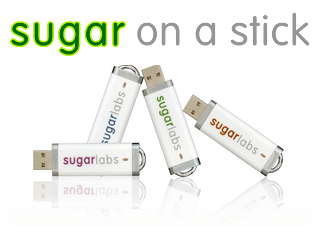Difference between revisions of "Sugar on a Stick/Downloads"
Jump to navigation
Jump to search
(this reference from fixed known bugs to as yet not fixed known bugs is not useful to the reader) |
(Changed in reaction to GCI task 5179691623776256 and others.) |
||
| (9 intermediate revisions by 2 users not shown) | |||
| Line 6: | Line 6: | ||
Sugar on a Stick will run on | Sugar on a Stick will run on | ||
| − | * any | + | * any Notebook, Laptop, or Desktop computer, with a minimum of 1GB RAM, that can run Linux, Windows or macOS, using a USB thumbdrive or stick, as a [[wikipedia:Live USB|Live USB]], |
* a Raspberry Pi 2 or 3, using a microSD card<!-- it is not a Live system, but an installed system-->, or; | * a Raspberry Pi 2 or 3, using a microSD card<!-- it is not a Live system, but an installed system-->, or; | ||
* any computer as a virtual machine. | * any computer as a virtual machine. | ||
| Line 12: | Line 12: | ||
You can use Sugar on a Stick to demo Sugar almost anywhere without disturbing the contents of the computer you use, and if people like what they see, you can [[Tutorials/Installation/Install with liveinst|install]] Sugar on a Stick to their hard drives or other sticks from the demo stick. | You can use Sugar on a Stick to demo Sugar almost anywhere without disturbing the contents of the computer you use, and if people like what they see, you can [[Tutorials/Installation/Install with liveinst|install]] Sugar on a Stick to their hard drives or other sticks from the demo stick. | ||
| − | Our most recent version of Sugar on a Stick was released on ''' | + | |
| + | |||
| + | Our most recent version of Sugar on a Stick was released on '''29 October 2019''' with '''Fedora 31'''. | ||
|- style="border: 0; border-width: 0; text-align: center" | |- style="border: 0; border-width: 0; text-align: center" | ||
| colspan="2" style="border: 0; border-width: 0; text-align: left" | | | colspan="2" style="border: 0; border-width: 0; text-align: left" | | ||
| − | <span class="linkgroup">[[File:Download Mirabell.png|link=https://download.fedoraproject.org/pub/fedora/linux/releases/ | + | <span class="linkgroup">[[File:Download Mirabell.png|link=https://download.fedoraproject.org/pub/fedora/linux/releases/31/Spins/x86_64/iso/Fedora-SoaS-Live-x86_64-31-1.9.iso]]</span> |
| − | x86_64 (64-bit), see [ | + | x86_64 (64-bit), see [https://docs.fedoraproject.org/en-US/fedora/rawhide/install-guide/ How to install]. |
|- | |- | ||
| colspan="2" style="border: 0; border-width: 0; text-align: left" | | | colspan="2" style="border: 0; border-width: 0; text-align: left" | | ||
| − | <span class="linkgroup">[[File:Download Mirabell.png|link=https://download.fedoraproject.org/pub/fedora/linux/releases/ | + | <span class="linkgroup">[[File:Download Mirabell.png|link=https://download.fedoraproject.org/pub/fedora/linux/releases/31/Spins/armhfp/images/Fedora-SoaS-armhfp-31-1.9-sda.raw.xz]]</span> |
| − | armhfp Raspberry Pi 2 or 3, see [ | + | armhfp Raspberry Pi 2 or 3, see [https://github.com/sugarlabs/sugar/blob/master/docs/rpi-soas.md How to install]. |
|- | |- | ||
| colspan="3" style="border: 0; border-width: 0; text-align: left" | | | colspan="3" style="border: 0; border-width: 0; text-align: left" | | ||
| Line 33: | Line 35: | ||
| | | | ||
See the [https://spins.fedoraproject.org/soas/download/index.html Spins download page]<br> for the following: | See the [https://spins.fedoraproject.org/soas/download/index.html Spins download page]<br> for the following: | ||
| + | * 32-bit processor image | ||
* ARM<sup>®</sup> Technology downloads | * ARM<sup>®</sup> Technology downloads | ||
| − | |||
* Some support links | * Some support links | ||
| colspan="2" | | | colspan="2" | | ||
| + | <!-- | ||
'''[https://alt.fedoraproject.org/pub/alt/live-respins/ Fedora Live Respins]''' are like the official release but with officially updated Fedora components. | '''[https://alt.fedoraproject.org/pub/alt/live-respins/ Fedora Live Respins]''' are like the official release but with officially updated Fedora components. | ||
* Many bugs have been fixed in these Respins, but new ones may occasionally render the download unbootable. | * Many bugs have been fixed in these Respins, but new ones may occasionally render the download unbootable. | ||
* Checksums to verify the integrity of downloads are in a file at the top of the Respins directory. | * Checksums to verify the integrity of downloads are in a file at the top of the Respins directory. | ||
| + | --> | ||
|} | |} | ||
''Fedora and the Infinity design logo are trademarks of Red Hat, Inc.'' | ''Fedora and the Infinity design logo are trademarks of Red Hat, Inc.'' | ||
Revision as of 21:25, 6 December 2019
Project Home · Get Involved · Contacts · Resources · FAQ · Roadmap · To Do · Meetings
| Sugar on a Stick is a Fedora® Spin operating system featuring the award-winning Sugar Learning Platform.
Sugar on a Stick will run on
You can use Sugar on a Stick to demo Sugar almost anywhere without disturbing the contents of the computer you use, and if people like what they see, you can install Sugar on a Stick to their hard drives or other sticks from the demo stick.
Our most recent version of Sugar on a Stick was released on 29 October 2019 with Fedora 31. | ||
|
| ||
|
| ||
|
See also;
| ||
|
See the Spins download page
|
||
Fedora and the Infinity design logo are trademarks of Red Hat, Inc.

